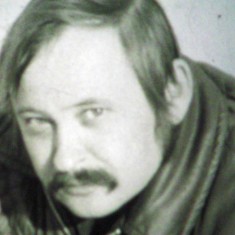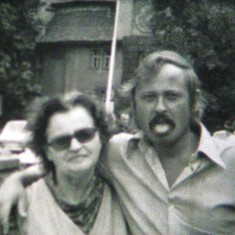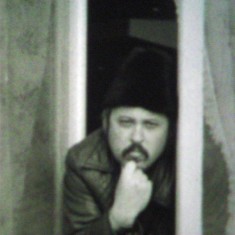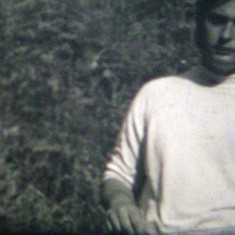Mr. Roman
A performance on the life of Mr. Roman, a life that was recorded in a DIY way on the 8 mm format. 8 film rolls showing the life of an unknown family became one of the film materials used in the work on the piece EKRAN. This homemade film is now being used as a central material in a project named Mr. ROMAN.
Authors, artists, info:
Creators: | Ježek, Freudl, Procházka |
Length: | 55 minutes |
no language barrier | |
First night: | The Jihlava International Documentary Film Festival 2009 Czech republic |
Supported by: | the Ministry of Culture, the Capital of Prague |
Production: | jedefrau.org |
The projection is accompanied by live music played on pre-digital electrophonic instruments.The project was ment to be producted as a housing event for smaller group of visitors, where the people coming can alsobring some home-made snack, so that everything altogether generates a reminiscence of the housing events of the 80´s.
The found footage was not digitalized and is presented in its original form, that is, as a direct, physical, witness of the recorded events. A new dynamics achieved by the division of the recorded material on two projectors (Martin Ježek) offers a new perspective on the found footage, otherwise presented totally unchanged. The project aims at keeping the film rolls as much is their original length as possible, not choosing only the action scenes or selecting only certain parts to modify the narrative.
Mr. ROMAN stands for a second part of a loose trilogy of pieces not using computers or other machines based on software or including integrated circles.
The project Mr. ROMAN is being co-created by Martin Ježek who is concerned with 8 mm film format in the long-term.
From an interview with Martin Ježek
At this year´s Jihlava festival, you are preparing an audiovisual event from the family archive of Mr Roman, with Handa Gote, which will be projected in a private flat. What exactly will there be to see?
It is an audiovisual composition for two 8mm projectors, 2 stereopticons, guitar, electrophonic organ and a magnetic tape. I will project amateur home films, which I was given by Handa Gote. They are the iniciators of the whole project; I actually just realise the visual part. I was given a fairly free hand with the work with the unfamiliar archive material. The only condition was that some chronology should be apparent. This material starts in 1960 and ends in 1980, and in it there is a visible transformation of a ten year old boy into an adult. I do not know anything more detailed about "Mr Roman," who is the central character in these home films. It is simply found footage.
Your audiovisual tape is a part of Handa Gote´s performance at the Jihlava festival?
Yes, people will sit in this private flat, all around the 8mm projectors, and Handa Gote will play improvised musical accompaniment to the silent films; I expect it to be in an „easy listening" style from the sixties and seventies. Along with that, they will probably play noise pre-recorded on the tape. It is still not sure where it could end up. It could be a sweaty, home retro party, like a souvenir of the people who met in these flats. We want to conceive it authentically - what people bring there, we will work with. I mean, for example, even alcoholic drinks etc.
Martin Ježek
(born 1976 in Prostějov) is one of our most important makers of formal and conceptual film. His work almost universally has an extremely formal stance: scores and concepts which define the appearance of a film work before it is realised. He often works on his films in a sleeping car travelling across Europe, in which he is employed as a conductor in the sleeping and reclining cars. Ježek, as one of the most radical presenters of structural documentaries, defines the theme and the circumstances of shooting and editing, so that afterwards he can realise the film brut without considering its actual likeness.

.jpg_thumb.jpg)



.jpg_thumb.jpg)

.jpg_thumb.jpg)


